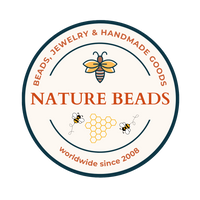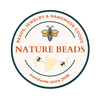What's Tagua or Vegetable Ivory?
❁ Quick Facts about these Tagua Slices:
1. Are they the same?
NO. No two slices are the same. These Tagua Slices, in particular, will have the same shape, but each will present their own characteristics. Details such as growth ring, bark, and even thickness will vary one to another.
2. Weight?
Rest sure that most all Tagua Nut products, except the whole Tagua Nuts, are very lightweight. So, lightweight you will forget you have them on. As they say, light as a feather!
3. Are they Eco-Friendly?
YES. The Tagua Nut in itself is a natural product and our dyes are imported from Europe, certified eco-friendly, metal and azo free.
4. Are the Tagua Slices colorfast?
All Tagua products are polished and fixed during production and you should not have any problems. However, we have cases where the oil content of the Tagua Nuts is higher and the dye won't be fixed properly. If you have issues, we're happy to work with you.
5. Can Tagua products get wet?
Yes. Though I'd suggest that you don't get your jewelry wet, sometimes it just happens. In this case, lay it on a towel where it can air dry. Please, no direct sun when these are wet. As an ivory product, it will expand and contract and the color will change. Once the beads are polished, the color is sealed in. Once wet, Tagua products expand and exposure the dye. It will definitely make the color fade if repeatedly wet.
6. What's the finish on these Tagua Slices?
All tagua products, unless stated, are 100% natural. They are polished in wooden tumblers with wooden pegs. No lacquer or varnish used on any of our products. Here and there we have handpainted items, which need to be lacquered over.
7. Are your Tagua products Fair Trade?
Absolutely! We purchase directly from the artisans and makers to ensure that they are fully supported by their craft. By purchasing our products, that being Tagua, Acai, African & our goods from India & Nepal, you are fully supporting the artisans directly. Thank you!
❁ What's Tagua?
You may have heard of Tagua or Vegetable Ivory, but what exactly is it? Tagua happens to be one of the most amazing products on earth and I'm quite a fan of it! It's 100% renewable, it is considered vegetable ivory because its density is so close to the density of animal ivory. It is so close that sometimes you cannot tell the difference. How do we know this? We supplied NASA with little Tagua Rounds for some kind of experiment. Pretty cool, right!
The Tagua palm grows in the rainforest of the Andes, from Colombia to southern Peru and adjacent countries. It is one of those trees that can be used 100%, from the palm leaves to its core. The big spike and unusual Tagua clusters are full of tiny Tagua Nuts inside. The fruit itself is quite exquisite and it tastes like a mild fresh coconut. I had to test it myself!
Economically speaking, Tagua is still one of the main sources of income to many artisans and small business families in South America. There are families who are supported 100% by their craft and by Tagua, bless those palm trees. Not only Tagua is an important item for South American artisans ait also can save lives. Imagine using friendly plant ivory instead animal ivory, where animals are hurt and killed for.
By purchasing plant ivory, you're saving lives as well. The more plant ivory is out there, the more popular it becomes and the bigger are the chances of elephants, hippos and other animals to live another day.
1. Are they the same?
NO. No two slices are the same. These Tagua Slices, in particular, will have the same shape, but each will present their own characteristics. Details such as growth ring, bark, and even thickness will vary one to another.
2. Weight?
Rest sure that most all Tagua Nut products, except the whole Tagua Nuts, are very lightweight. So, lightweight you will forget you have them on. As they say, light as a feather!
3. Are they Eco-Friendly?
YES. The Tagua Nut in itself is a natural product and our dyes are imported from Europe, certified eco-friendly, metal and azo free.
4. Are the Tagua Slices colorfast?
All Tagua products are polished and fixed during production and you should not have any problems. However, we have cases where the oil content of the Tagua Nuts is higher and the dye won't be fixed properly. If you have issues, we're happy to work with you.
5. Can Tagua products get wet?
Yes. Though I'd suggest that you don't get your jewelry wet, sometimes it just happens. In this case, lay it on a towel where it can air dry. Please, no direct sun when these are wet. As an ivory product, it will expand and contract and the color will change. Once the beads are polished, the color is sealed in. Once wet, Tagua products expand and exposure the dye. It will definitely make the color fade if repeatedly wet.
6. What's the finish on these Tagua Slices?
All tagua products, unless stated, are 100% natural. They are polished in wooden tumblers with wooden pegs. No lacquer or varnish used on any of our products. Here and there we have handpainted items, which need to be lacquered over.
7. Are your Tagua products Fair Trade?
Absolutely! We purchase directly from the artisans and makers to ensure that they are fully supported by their craft. By purchasing our products, that being Tagua, Acai, African & our goods from India & Nepal, you are fully supporting the artisans directly. Thank you!
❁ What's Tagua?
You may have heard of Tagua or Vegetable Ivory, but what exactly is it? Tagua happens to be one of the most amazing products on earth and I'm quite a fan of it! It's 100% renewable, it is considered vegetable ivory because its density is so close to the density of animal ivory. It is so close that sometimes you cannot tell the difference. How do we know this? We supplied NASA with little Tagua Rounds for some kind of experiment. Pretty cool, right!
The Tagua palm grows in the rainforest of the Andes, from Colombia to southern Peru and adjacent countries. It is one of those trees that can be used 100%, from the palm leaves to its core. The big spike and unusual Tagua clusters are full of tiny Tagua Nuts inside. The fruit itself is quite exquisite and it tastes like a mild fresh coconut. I had to test it myself!
Economically speaking, Tagua is still one of the main sources of income to many artisans and small business families in South America. There are families who are supported 100% by their craft and by Tagua, bless those palm trees. Not only Tagua is an important item for South American artisans ait also can save lives. Imagine using friendly plant ivory instead animal ivory, where animals are hurt and killed for.
By purchasing plant ivory, you're saving lives as well. The more plant ivory is out there, the more popular it becomes and the bigger are the chances of elephants, hippos and other animals to live another day.


